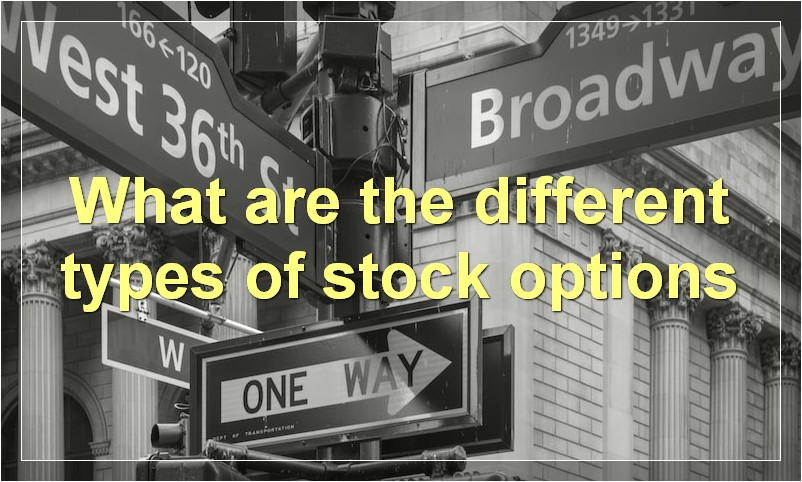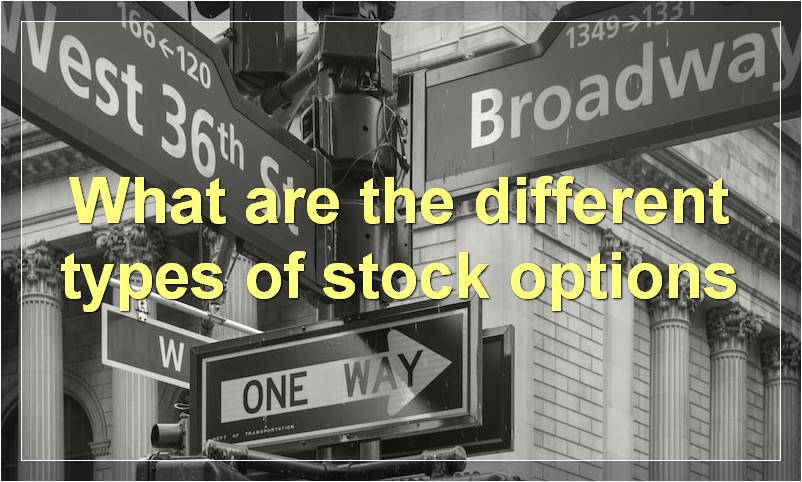If you’re thinking about investing in stock options, you need to read this first.
What is a stock option
A stock option is a contract that gives the holder the right, but not the obligation, to buy or sell shares of a stock at a specified price within a certain period of time. Stock options are a popular form of compensation for executives and employees at companies in many industries.
Stock options can be an attractive form of compensation because they have the potential to generate significant profits. If the price of the underlying stock rises above the strike price, the option holder can exercise the option and buy the stock at the strike price, then sell it immediately at the higher market price and pocket the difference.
What are the different types of stock options

There are two main types of stock options: call options and put options.
Call options give the holder the right to buy a certain number of shares of the underlying stock at a set price within a certain time frame. Put options give the holder the right to sell a certain number of shares of the underlying stock at a set price within a certain time frame.
Both call and put options are contracts between two parties, and both have an expiration date. The party who buys the option is called the “holder,” while the party who sells it is called the “writer.”
The price at which the option can be exercised is called the “strike price.” For a call option, this is the price at which the holder can buy the underlying stock. For a put option, this is the price at which the holder can sell the underlying stock.
The premium is the price that the holder pays for the option. This is generally much less than the strike price, since it only gives the holder the right to buy or sell, not the obligation.
If you own a call option, you are “long” on that particular stock. This means that you believe the stock will go up in value. If you own a put option, you are “short” on that particular stock. This means that you believe the stock will go down in value.
Options are often used as part of a hedging strategy, to protect against losses in other investments. They can also be used to speculate on future movements in stock prices.
What is a call option
A call option is a contract that gives the holder the right to buy an underlying asset at a specified price within a certain time frame. Call options are often used as a way to hedge against investment risk, or to speculate on the future price of an asset.
The price of a call option is typically set at a premium to the current market price of the underlying asset. This premium reflects the perceived risk associated with holding the option, as well as the time value of money.
When the option expires, the holder will only exercise their right to buy the underlying asset if it is trading above the strike price. If the asset is trading below the strike price, the option will expire worthless.
Call options can be traded on a variety of different underlying assets, including stocks, commodities, currencies, and indexes.
What is a put option
A put option is a contract that gives the holder the right, but not the obligation, to sell a specified amount of an underlying asset at a specified price within a specified time period.
What are the benefits of investing in stock options
When it comes to investing, there are many different options available to individuals. One option that has gained popularity in recent years is stock options. So, what are the benefits of investing in stock options?
1. Stock options can provide a higher return on investment than other types of investments.
2. They can be less risky than other types of investments, such as stocks and bonds.
3. Stock options can be a good way to diversify your investment portfolio.
4. They can be used to hedge against other investments in your portfolio, such as stocks.
5. You can control the risk/reward profile of your investment by choosing how much you want to invest in stock options.
6. Stock options can be liquidated quickly if needed.
7. You can use stock options to take advantage of market trends.
8. You can use stock options to generate income.
9. You can use stock options to protect your portfolio from market volatility.
10. There are many different strategies that can be used when investing in stock options, which gives you the flexibility to tailor your investments to your specific goals and risk tolerance.
What are the risks of investing in stock options

Investing in stock options is a risky proposition. While you may have the potential to make a lot of money if the stock price goes up, you could also lose a significant amount of money if the stock price goes down. In addition, there is always the risk that the company whose stock you are invested in will go bankrupt, which would mean that you would lose all of your investment.
What is the difference between a call option and a put option
When it comes to options, there are two types: calls and puts. Both give the holder the right, but not the obligation, to buy or sell an underlying asset at a specified price on or before a certain date. So what’s the difference between a call and a put?
A call option gives the holder the right to buy an underlying asset at a specified price on or before a certain date. A put option gives the holder the right to sell an underlying asset at a specified price on or before a certain date.
The key difference between a call and a put is who has the rights and obligations. With a call option, the holder has the right to buy the underlying asset, but the seller has the obligation to sell it. With a put option, the holder has the right to sell the underlying asset, but the buyer has the obligation to buy it.
What are the “greeks” and how do they affect stock options
The “greeks” are a set of mathematical variables that are used to determine the sensitivity of an option’s price to various factors. These factors include the underlying asset’s price, the option’s strike price, the volatility of the underlying asset, the time to expiration, and interest rates. By understanding how these variables affect the price of an option, traders can make more informed decisions about which options to buy or sell, and when to do so.
How can I use stock options to hedge against risk in my portfolio
If you’re looking to hedge against risk in your portfolio, one option is to use stock options. By buying put options on stocks in your portfolio, you can protect yourself against a drop in the stock price. If the stock price falls, the value of your put option will increase, offsetting some of the loss. Just be sure to keep an eye on the expiration date of your options, as they will eventually expire and will no longer provide protection.
What strategies can I use to trade stock options
When it comes to trading stock options, there are a few key strategies that you can use in order to help you make the most of your investments. One strategy is known as covered call writing, which involves selling call options on a stock that you already own in order to generate income. Another popular strategy is known as buying puts, which allows you to hedge your bets against a potential decline in the stock market.

